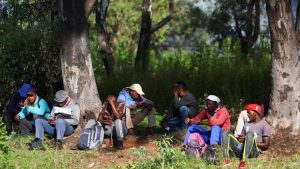KwaZulu-Natal Premier Sihle Zikalala says the province will be strengthening its precautionary measures at border posts and ports of entry after the number of confirmed coronavirus cases in the province increased to seven.
Addressing NGOs and HIV/Aids stakeholders at Grey’s Hospital in Pietermaritzburg, Zikalala says precautionary screening will be expanded to testing at the border posts.
The KwaZulu-Natal government says it is working hard to contain the coronavirus – COVID-19.
The increase in cases in the province to seven has prompted the government to strengthen its precautionary measures at the King Shaka International Airport in Durban, the province’s two harbours, and border posts with Mozambique, Swaziland and Lesotho.
There are now 17 confirmed cases in the country, with the bulk of them in KwaZulu-Natal.
‘Cough into their elbow’
Zikalala says the infected people are being assisted by the Health Department and has called on people not to panic.
“We have seven cases, we are treating those cases. We will be visiting entry points in KwaZulu-Natal. The first entry point is the airport. Already when you land in King Shaka you are tested, you go through the process.”
Zikalala say people are being educated about the virus at schools and clinics. He urged the public to remain cautious and avoid spreading miss-information about the virus. Zikalala says anyone can get infected despite their race.
“It has no colour, it affects all people. But we should equally agree that we should address the fear. The general fear that once you are infected you will be sick and you will die now. That is not correct.”
He has urged citizens to cough into their elbow or a paper handkerchief, and wash their hands regularly. Zikalala is expected to visit both King Shaka International Airport and the Durban Harbour soon.
Below is the video of SABC Reporter, Londi Radebe on KZN’s plans to tighten measures:
KZN COVID-19 patient doing well
The provincial Department of Health says the 38-year-old patient who was the first to test positive for COVID-19 in the country is doing well.
The man is currently receiving treatment at Greys Hospital. The National Institute for Communicable Diseases (NICD) confirmed that two of the seven cases in KwaZulu-Natal are from Pietermaritzburg, while the other four are in Durban.
In the video below, SABC Reporter, Chriselda Lewis says all of SA’s current COVID-19 cases are not linked to China:
Gauteng infections
Gauteng Health MEC, Bandile Masuku has clarified that the 57-year-old man with an underlying condition of renal disease, who tested positive for the coronavirus and the younger patient in the northern suburbs are both doing well.
There are four other confirmed cases of the COVID-19 infection in Gauteng and the Western Cape has one confirmed case.
Masuku says they expect all the people who came into contact with the country’s confirmed cases of coronavirus will be located and contacted by Thursday afternoon.
On Friday, 122 South Africans being repatriated from China, where the outbreak began, are expected to arrive back in the country.
Speaking on Morning Live, Masuku says authorities are monitoring the older patient as he has an underlying condition of renal disease.
“I just want to correct one fact about the 57-year-old, the actual fact is that the person whose actually doing quite badly is the patient around the north suburbs, the younger gentleman. But when I called this morning they told me that he is actually recovering well and he is actually getting better. The older gentleman we are only worried about him because he is in a high-risk group in terms of age and in terms of the disease, which is renal disease, but he is still doing well.”
Earlier it was reported that the older man was in a critical condition.
Below is a video of Bandile Masuku’s interview with Morning Live discussing the coronavirus cases in Gauteng:
Infographic of coronavirus cases in SA:

Below is a video mapping the coronavirus footprint in Africa:






